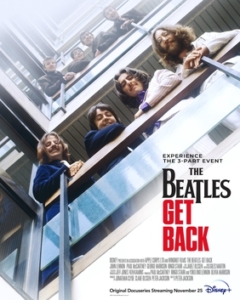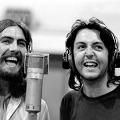- Old Draft: Beatles Folk Memory 1970-1995 - December 8, 2025
- Lights are back on. - December 8, 2025
- From Faith Current: “The Sacred Ordinary: St. Peter’s Church Hall” - May 1, 2023
 [Folks, I responded to a comment from @Erin this afternoon, and felt that I was able to express some complex, important stuff in a reasonably concise way, so I’m surfacing it here.
[Folks, I responded to a comment from @Erin this afternoon, and felt that I was able to express some complex, important stuff in a reasonably concise way, so I’m surfacing it here.
But before you read that…
Whatever else they might be, The Beatles are an historical phenomenon; which means two things. First, each fan must create their own idea of the group out of the scraps that speak to them; all fans do this. But loving an historical thing means each fan’s mental fabrication, made-to-measure and drawing from the fan’s own preferences, moods and emotional needs, is more and more idiosyncratic, and can now exist unsullied by new data. In 1966, The Beatles were both much more limitless (what would they do next?) and also terribly finite, concrete—a thing in the world, the parameters of which were largely agreed upon. Today, it is all much more personal…and in the endless bullshit factory of the internet, debated constantly, each fan arguing passionately for their personal vision of The Beatles. But there was that finite thing, that historical happening interlocked with infinite other happenings, influencing and being influenced by them all.
Second, loving historical pop culture forces a person into a tension with the present. You live now, but you prefer then (or your idea of then). Some fans relieve this by creating a version of the group and its members that reflects the present—not the historical people, events, pressures, prejudices, etc. Loving an historical thing requires a kind of wisdom and self-knowledge not necessitated by the latest blurt from the Marvel Cinematic Universe.
As with so much else, late-stage capitalism makes all this worse. Our culture’s premium on the new means it is shot through with “the anxiety of influence.” We attempt to dominate history, to rewrite it in the present’s own image, or encode our preferences and prejudices in the past, so they may be excused in the present. Every era does this, it is deeply human to do so. But until we own up to it, there’s little chance of learning from the past, or understanding it, or even seeing it clearly. If all my writing on Dullblog has a throughline, it is perhaps a yawp against “presentism,” the Panglossian faith that the preferences of the current moment represent Humanity at its zenith.
The Beatles, a disposable pop group fifty years old and counting, refute “presentism” quite powerfully. What you do next? Thats where things get interesting.—M.G.]
@Erin wrote…
Michael, it’s depressing to think about the editor cutting [the Get Back footage] a certain way, but thanks for reminding me to be aware of this. I tend to be much too believing of other people’s perspectives. I would love to come at this film without analyzing it, but I know myself–thats going to be impossible.
Others have said “Let It Be” was a bit too negative, but it sounds like you (Michael) believe that narrative is largely true. Am I understanding you correctly? I’m fascinated by how divisive “Let It Be” seems to be even now.
I wish we could know that Jackson was just showing us all the extra footage, cleaned up, with no agenda. But I suppose every creator, including myself in my own writing, has a goal/purpose, and thus a bias.
@Erin, couple things:
Every creative project is the construction of a narrative out of the chaos of data. This very much includes journalism, documentary, and history. The narrative is not, and can never be, reality; at best it can illuminate an aspect of reality which you will then understand better in your mind.
Every creative project reflects how/who it was funded, and the biases of its time. Peter Jackson’s WWI documentary existed to 1) laud the common soldiers of WWI, and 2) make modern audiences feel kinship with them by making them “look real” (ie, in color and sped up). These are reasonable goals but they are intimately connected to who was funding the project and why, and who was providing the raw footage and why (the Imperial War Museum). And that film was inherently political — as this one will be, too. Look at how Lennon is portrayed, and you’ll see the politics; he’s a lightning rod for left and right.
The creation of any item is a social process–it is shaped by the desires/opinions/skill of a group of people. “Let It Be” was not the truth; “Get Back” will not be the truth. Both are, at best, sincere attempts to show reality as it was in January 1969. The fact that they are for-profit makes this less likely; the fact that people really care about The Beatles makes it less likely. The fact that Paul, Ringo, and Yoko are still alive makes this less likely. In a capitalist society, truth can only be told if it sells.
The “Beatles with their trousers off” ethos of “Let It Be” was very much an ethos of January 1969. (And it was very “New Showbiz.”) The ethos of our current time is to have a much more nuanced, often self-pwning relationship with the truth of celebrities. Stars big and small are very adept at seeming to show truths, while maintaining a very carefully constructed public image. The very fact that “Get Back” is coming out now, instead of 1995, makes me wary of it; Anthology had some rough edges that made me trust it. Big media companies have gotten a lot better at giving the public faux-revelations, and have had 30 more years’ practice fine-tuning “the star as product.” And audiences today aren’t really interested in “Beatles with their trousers off.”
Finally, the mere fact that “Get Back” is appearing 52 years after the fact, rather than 18 months, makes it less likely than “Let It Be” to be close to the truth. The world is a very, very different place now, and the idea that a 2021 brain could sync up with a 1969 event very well is very unlikely. “Get Back” will be–at best–a 2021 interpretation of an event in 1969. And that is why it is being made today; the end of the Beatles’ story, as told in 1970 with “Let It Be,” is dissatisfying to the principals of Apple. It is also dissatisfying to some fans–hence “divisive.” This is weird to me.
When I was coming up in the Beatles fandom, nobody had any problem with “Let It Be.” We didn’t like it — how could you? — but we didn’t think it was lies. We didn’t have the same relationship to our obsessions as people do today. The Beatles made this movie, it seemed to show certain things, you might have opinions about those certain things, but it was accepted as the movie The Beatles gave us, and thus as factual as the tracks on Revolver. Now, fans have a very different relationship to all this stuff; there’s definitely a sense of “fan as customer” working here. A significant number of fans don’t like the story, so Peter Jackson has been brought in to see if there’s another story in the footage, one that fans will like more. And pay for — while at the same time, the Official Narrative becomes a little more forgiving. Paul will be less bossy, Yoko less weird and controlling; both will be more sympathetic. Like those WWI soldiers.
This may seem utterly cynical on my part, but recognize that this wouldn’t be happening if a different story couldn’t be made out of the footage. No one would be paying Peter Jackson to make a 6-hour cut of “Let It Be.” A different, more pleasant, more marketable narrative is why this movie exists; but that’s not a value-neutral thing, regarding history. Considering the January 1969 sessions as pleasant, happy, productive–this is a major revision to the story, as if the …. Pepper Deluxe Edition contained a bunch of tracks that sounded like Nirvana. A positive spin on the “Get Back” sessions, while more sellable and certainly more comforting to Paul, Ringo and Yoko in their dotage, actually deepens the mystery of the breakup, and suggests that Lennon was even more culpable. If the group was naturally growing apart, then John didn’t have to do much extra to get his divorce; but if it was still basically functional, well…
To answer your question if I think “Let It Be” is essentially true, I would say that I find it odd that this is even a question. It has been the only data we have on the period, along with interviews after the fact. And the film, and the interviews, told the same story. I think we should be very careful, because The Beatles’ history is now in the hands of the members of the group who were more likely to be politic, and the two members who relished telling “the inside story” are now dead. And Yoko, who came off so badly in “Let It Be” that she was considered the villain of the breakup — the first time I saw “Let It Be” in the theaters in 1978 or so, she was actually booed and hissed whenever she came on the screen — the Jackson documentary is an excellent attempt to rehabilitate Yoko’s reputation. Something she surely desperately wants before she dies.
I never believed that Yoko was the sole cause of the breakup; but if one says that the narrative of “Let It Be” was showing four friends who were thoroughly sick of each other, sick of the pressures of fame, making music at a low creative ebb (I simply don’t like the MUSIC of “Let It Be”), I always bought that 100%. Not just because of the movie, but also the interviews after, and the bitterness after, and the bad-vibes bootlegs, and — “Let It Be” explains the breakup, which is I think what it was meant to do, ultimately. And while Jackson’s super-cut of happiness might sway me a bit, you still have to deal with all the interviews, particularly with John and George, which confirm the earlier movie. What I wish happened doesn’t enter into it; The Beatles aren’t the MCU — fans can’t make the story into what they wish, and call it canon. For that, they need help, and I think that’s what Jackson is providing here.










Well, I’ve just come from listening to Paul McCartney on Fresh Air, and he was certainly bubbly about “Get Back”! I guess he does feel absolved by it. And it only gets tricky when you think, “Hmm, he basically commissioned this, didn’t he…” But he said to Terry that he didn’t see how it could be whitewashed because it was “on film.”
So that’s the poster? Very cool.
I loved the Fresh Air interview, though.
Great piece Michael.
I do wonder about this:
“I think we should be very careful, because The Beatles’ history is now in the hands of the members of the group who were more likely to be politic, and the two members who relished telling “the inside story” are now dead.”
I think George and John were cynical. Paul has said that John was a “debunker.” So why take their words over Paul and Ringo? Does cynicism trump positivity?
We know the interview John gave Jann Wenner after the breakup was not 100% accurate. John was not in great shape during “Let It Be”, so how do we trust his interviews?
I guess I’m of the mindset that the truth usually lies in the middle.
Me too, @Tasmin, but the big difference is that memories of something 18 months in the past (as with Lennon Remembers), are more likely to be accurate than memories that are 50+ years old. And when John and George were alive, we had Paul and Ringo ready to correct them. Now, we only have Paul and Ringo…so we have to remember what John and George said, and apply it ourselves.
Exactly! John and George had Ringo and especially Paul to correct anything they said. Since 2001, Paul has had It’s Only Ringo to correct him.
Michael, I’m sorry I didn’t see this sooner, and I want to thank you very much for responding to my post with an entire article of your own. I didn’t expect that at all, and I really appreciate it.
I think your cynicism/skepticism/whatever you want to call it is very wise. Obviously you have more knowledge about the entertainment industry than I, and I completely understand what you’re saying and where you’re coming from. I thank you for expanding on and explaining these issues.
I will say (as I said in my recent post on “What Happened in India?”) that, having just seen Let It Be and knowing the context, it actually didn’t seem nearly as dreadful as I expected. In fact it didn’t seem dreadful at all. It did seem dull (that film quality is awful), and yes there was some tension between Paul and George, but honestly I didn’t get the sense at all that the band was falling apart. Having issues, yes–falling apart, not necessarily. Again, I realize I’m coming at this from my 2021 perspective. But I tried to go into viewing with an open mind, not really knowing what I’d find (and with all the context bouncing around in my head too). And it just didn’t seem that awful to me.
I hesitate to say this, but…even Yoko didn’t seem that awful to me. She’s clearly there, and from comments I’ve read I know the other 3 (Pau especially) thought she made the sessions awkward (or worse), but I don’t get that from LIB. That said, I’ve only watched the film once and wasn’t necessarily trying to do a critical viewing. 🙂 Maybe I’m just bad at reading between the lines (although I like to think I’m reasonably decent at it!). Or perhaps I just had such a negative impression of LIB from reading about others’ thoughts on it, that I went in with incredibly low expectations and thus the film seemed not so negative to me.
Regardless, I do agree that every piece of art has a narrative and a purpose–I certainly have a purpose when I write the novels I do. Art is always subjective and personal. As Nancy has said, I don’t think LIB was the entire truth (although certainly closer to the truth, as you noted), nor will “Get Back” be the whole truth.
You make a good point about it coming out *now* though. That is interesting–why didn’t anyone else try to get their hands on this footage ten years ago? Why now? Did Peter Jackson have more influence/power at Apple than anyone else, or is he the only person who’s tried to look at the footage? I doubt it.
When it all comes down to it I guess I just want to see the extra footage to see what it will add to LIB. 🙂
Thank you again for this thoughtful, detailed response. Your analyses are always fascinating and intelligent, and part of why I love this site.
@Erin ” And it just didn’t seem that awful to me….”
I think those sessions were plagued more by tedium and apathy than outright hostility (as the White Album Sessions were). As you say, it’s dull. Paul is a workhorse, but everyone else looks like they want a holiday. They’re tired. It’s barely ten weeks since they put out a double album that took months of work to make. So what you get on screen is inertia. But it’s inertia with strained attempts at productivity and levity, because the cameras are on. The Beatles were never going to have their worst fights on camera. They were too self-aware for that. As long as they were being filmed, there was going to be an element of the performative leveled by self-consciousness. So the disagreements that do surface in Let It Be are very passive aggressive. There are no outright confrontations or swearing matches. In a way, they deserve credit for keeping their dignity relatively in tact. It could have easily turned out like The Troggs Tapes on video. (Worth bearing in mind though is that Let It Be was originally double its length, and 80 minutes is what was left after Lindsay-Hogg had satisfied the directives of four Beatles and a studio.)
What Michael said about neither Let it Be nor Get Back being the truth is crucial though, because assuming the opposite is also assuming that the Beatles lived out all the complexity of their lives and interpersonal relationships on film within a tidy 30 or so day narrative. There seems to be a sense by a lot of fans/media that Get Back can elucidate and lay to rest the contentions of history, if by sheer quantity alone. But 6 hours relative to a month is very little. And it’s even less compared to the days/months/years the Beatles spent together.
@Matt, very true; they were obviously good at putting their feelings aside to get things done (or try to). Apathy seems very dominant in LIB.
I’m quite new to this deep-dive into the details of Beatles stuff, especially c. 1968-70 (I tend to prefer to focus on relationships and overall feelings/impressions/big picture), so I don’t think I know quite as much as most of you on this site. Maybe I should just keep my less-informed opinions to myself. But I had no idea LIB was originally twice the length. I wonder what that was like–perhaps it was a bit more understandable. To me LIB feels a bit like it was dropped out of the sky, just a random bunch of clips that don’t seem to be connected to anything else. The Beatles mention the rooftop concert very little, so these sessions almost feel detached from reality a bit, to me.
Right, I certainly don’t think the entire truth can be shown in one film like LIB; I agree that neither film shows the entire truth, but parts. (At least I hope Jackson’s has pieces of truth in there. I hope he hasn’t shied away from the negative parts, at least.)
Also @Matt, there were parts of the LIB that were pretty dark: Lennon’s appearance (woo boy), obviously the tension between George and Paul, etc. Lennon certainly did not look good, physically.
Cripes, I wish I had ten weeks holiday a year and another four weeks in another country earlier in the year. Plus all the long weekends away inbetween. They were under contract to be productive like everyone else, not when they felt like it! Particularly when you consider the lousy employment conditions in Britain at the time. To think their first albums were knocked off in one or two days. “The Beatles were never going to have their worst fights on camera”. But had the engineers, studio staff, George Martin, insiders, family members etc. mentioned bad fights at other times?
“You make a good point about it coming out *now* though.”
The anniversary as a sales hook; the crescendo of all the 50 year anniversary packages.
Ugh, yes, of course. This is why I’m not into marketing.
And, I wanted to mention that, one, I don’t have a problem with LIB (see my thoughts about it not being as negative as I expected), and also, I would love to see “the Beatles with their trousers off” and I’m sure a lot of thoughtful Beatles fans would love to as well. I want all the information I can get, good bad or otherwise. That’s why if Jackson really is cleaning this up to make Jan. 1969 look happier than it was, yeah, that ticks me off. If all the footage he’s found lends to the Beatles’ narrative they pushed in the 70s/80s, then he should make the film that way.
Again, this is getting into narrative. which is complicated. But I just wanted to say that I know I would really like any new info on the Beatles–negative or positive. I don’t want a positive film if it’s not reflecting the truth. (Then again, what *is* truth?) There’s so much we don’t know. (And probably stuff we shouldn’t.)
Also, that is definitely a very purposeful choice for the poster, isn’t it. Interesting. That tell us a lot right there.
@Erin, it was Apple who approached Peter Jackson, not the other way round. Jackson was reluctant to take on the job at first because he couldn’t stand the idea of ploughing through hours of misery fest tapes. What he eventually uncovered surprised him. Jackson has made it quite clear that there was no edict from Paul and Ringo or from the estates of John and George. There was no instruction from any of them what to put in or leave out, so I don’t know why this idea of Paul attempting to change the narrative persists.
@Lara, my apologies if I sounded like I was certain Paul is trying to change anything; I’m not sure at all, just throwing ideas out there. And maybe I’ve been reading too much about another aging celebrity who seems to be trying to cement their legacy in a certain way, but I wouldn’t be surprised if Paul does want to be viewed a certain way in history. That being said, I hope he isn’t trying to change anything, either with the Lyrics or this film or anything else, but you never know.
However, if Apple approached Peter Jackson, that actually makes me wonder more about Paul having something to do with this project. Why bring this stuff out of the vaults now? Just because of the new technology we have to clean up old film? Still, perhaps Paul didn’t have any part of this either.
I do appreciate that Paul and Ringo didn’t give Jackson any commands or direction with this–I hope that’s truly the case in fact. Regardless, sorry for any confusion, I was simply tossing out an idea.
I haven’t had a chance to watch yet- I’m saving it for my next day off work- but here is a review that goes into detail- warning for spoilers!
I thought I’d share as the reviewer specifically addresses “Paul and Ringo whitewashing” concerns that have been mentioned here.
He says the first episode of the series is actually darker then all of Let it Be and that rather then putting a happier spin the film actually provides more depth and shows what’s great about the Beatles as a band while also acknowledging the underlining impending and inevitable doom of their breakup.
https://www.google.com/amp/s/variety.com/2021/film/reviews/the-beatles-get-back-review-peter-jackson-1235118878/amp/
This is another good read as an semi review broader article around “Get Back”, it’s about the role women- both the girlfriends and women in the general sense like Maureen Cleve Astrid Kirtcherr etc- played in the Beatles professional lives and views and how in such a traditionally patriarchal and misogynistic tine period the Beatles were forward thinking in their views and appreciation of women.
https://www.google.com/amp/s/theconversation.com/amp/friday-essay-yoko-linda-get-back-and-shifting-perceptions-of-the-women-of-the-beatles-171822
Just a little note, also related to micromoments in Beatles music. There’s a vibrant “burp” in the last seconds of YKMName interpolated between John’s snarling, all circumstancial evidence points to sir Macca, I’ve always taken it as a statement, sort of. 8)